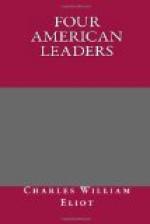Franklin never seems to have perceived that the supreme tests of civilization are the tender and honorable treatment of women as equals, and the sanctity of home life. There was one primary virtue on his list which he did not always practise. His failures in this respect diminished his influence for good among his contemporaries, and must always qualify the admiration with which mankind will regard him as a moral philosopher and an exhorter to a good life. His sagacity, intellectual force, versatility, originality, firmness, fortunate period of service, and longevity combined to make him a great leader of his people. In American public affairs the generation of wise leaders next to his own felt for him high admiration and respect; and the strong republic, whose birth and youthful growth he witnessed, will carry down his fame as political philosopher, patriot, and apostle of liberty through long generations.
WASHINGTON
The virtues of Washington were of two kinds, the splendid and the homely; I adopt, for my part in this celebration, some consideration of Washington as a man of homely virtues, giving our far-removed generation a homely example.
The first contrast to which I invite your attention is the contrast between the early age at which Washington began to profit by the discipline of real life and the late age at which our educated young men exchange study under masters, and seclusion in institutions of learning, for personal adventure and responsibility out in the world. Washington was a public surveyor at sixteen years of age. He could not spell well; but he could make a correct survey, keep a good journal, and endure the hardships to which a surveyor in the Virginia wilderness was inevitably exposed. Our expectation of good service and hard work from boys of sixteen, not to speak of young men of twenty-six, is very low. I have heard it maintained in a learned college faculty that young men who were on the average nineteen years of age, were not fit to begin the study of economics or philosophy, even under the guidance of skilful teachers, and that no young man could nowadays begin the practice of a profession to advantage before he was twenty-six or twenty-seven years old. Now, Washington was at twenty-one the Governor of Virginia’s messenger to the French forts beyond the Alleghanies. He was already an accomplished woodman, an astute negotiator with savages and the French, and the cautious yet daring leader of a company of raw, insubordinate frontiersmen, who were to advance 500 miles into a wilderness with nothing but an Indian trail to follow. In 1755, at twenty-three years of age, twenty years before the Revolutionary War broke out, he was a skilful and experienced fighter, and a colonel in the Virginia service. What a contrast to our college under-graduates of to-day, who at twenty-two years of age are still getting their bodily vigor through sports and not




